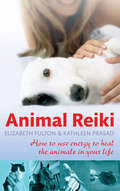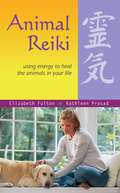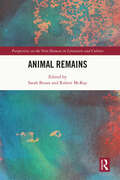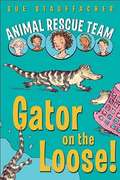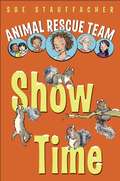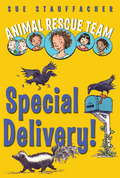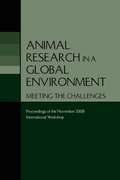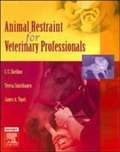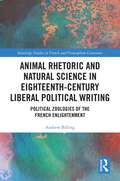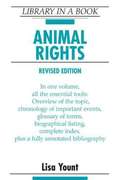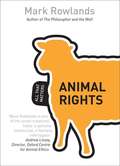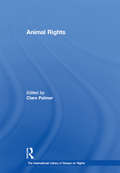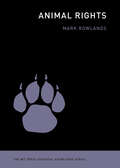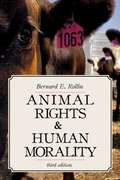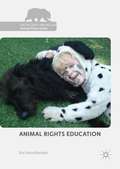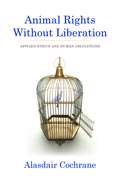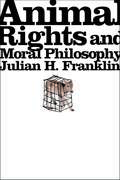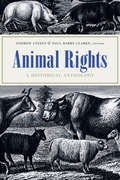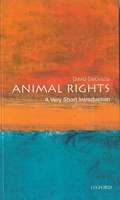- Table View
- List View
Animal Reiki: Using Energy To Heal The Animals In Your Life
by Elizabeth Fulton & Kathleen PrasadReiki is particularly effective in healing animals but there is very little specific information currently available. Whether you are a newcomer to the field of energy medicine, an experienced practitioner or an animal lover committed to learning everything you can about your companion’s health, Animal Reiki will open your eyes to a new level of healing and wellbeing. From dogs and cats to horses and birds, this book is everything you need to understand and appreciate the power of Reiki to heal and deepen the bond with the animals in your life.
Animal Reiki: Using Energy to Heal the Animals in Your Life (Travelers' Tales Guides)
by Elizabeth Fulton Kathleen Prasad“A great introduction to the growing field of energy medicine. . . . Easy-to-read . . . this book will be enjoyed by animal guardians and veterinarians alike.” —Shawn Messonnier, DVM, author of The Natural Health Bible for Dogs & CatsWhether you’re a newcomer to the field of energy healing, an experienced practitioner or an animal lover committed to learning everything you can about your companion’s health, Animal Reiki will open your eyes to a new level of health and well-being. From dogs and cats to horses and birds, this book is everything you need to understand and appreciate the power of Reiki to heal and deepen the bond with the animals in your life.“I learned a lot from Animal Reiki and highly recommend it to a wide audience.” —Marc Bekoff, University of Colorado, author of Minding Animals and editor of the Encyclopedia of Animal Behavior“Fulton and Prasad have created a much-needed guide to a method of helping animals heal that is gentle, intuitive, safe and powerful.” —Susan Chernak McElroy, author of All My Relations: Living with Animals as Teachers and Healers“A powerful reminder of the wider uses of the system of Reiki and how humanity can be of purposeful benefit to all.” —Bronwen and Frans Stiene, International House of Reiki, authors of A-Z of Reiki, The Japanese Art of Reiki and The Reiki Sourcebook
Animal Remains (Perspectives on the Non-Human in Literature and Culture)
by Robert McKay Sarah BezanThe dream of humanism is to cleanly discard of humanity’s animal remains along with its ecological embeddings, evolutionary heritages and futures, ontogenies and phylogenies, sexualities and sensualities, vulnerabilities and mortalities. But, as the contributors to this volume demonstrate, animal remains are everywhere and so animals remain everywhere. Animal remains are food, medicine, and clothing; extractive resources and traces of animals’ lifeworlds and ecologies; they are sites of political conflict and ontological fear, fetishized visual signs and objects of trade, veneration and memory; they are biotechnological innovations, and spill-over viruses. To make sense of the material afterlives of animals, this book draws together multispecies perspectives from literary criticism and theory, cultural studies, anthropology and ethnography, photographic and film history, and contemporary art practice to offer the first synoptic account of animal remains. Interpreting them in all their ubiquity, diversity and persistence, Animal Remains reveals posthuman relations between human and nonhuman communities of the living and the dead, on timescales of decades, centuries, and millennia.
Animal Rescue Team: Gator on the Loose!
by Sue StauffacherMeet the Carters: Mr. and Mrs. Carter, 10-year-old daughter Keisha, five-year-old Razi, baby Paolo, and Grandma Alice. Together, they run Carters' Urban Rescue, the place you call when you've got an animal where it shouldn't be. In their first adventure, there's a baby alligator at the city pool, which will seriously interfere with opening day, especially Keisha's cannonball practice. So it's up to the whole family to figure out what to do with the poor guy who has no business hanging around Michigan. Luckily for all of them, and thanks to some serious ingenuity from Keisha, the answer is closer than they ever could have imagined. Sue Stauffacher turns to her first series effort with Animal Rescue Team. With compelling plots based on actual events in her community, Sue has created a lovable cast of characters of boys and girls, young and old, who feel like people you'd meet at your neighborhood block party. Written in an accessible and engaging style meant to appeal to those independent readers looking to be excited and entertained, and with subplots about friendship, siblings, the environment, and animal conservation, along with plenty of humor, these will be a hit with teachers and librarians, and parents, as well as kids themselves.
Animal Rescue Team: Show Time (Animal Rescue Team #4)
by Sue StauffacherThe squirrels at Mt. Mercy College are getting too friendly-they're frightening the students, making the nuns jumpy... and they're super messy. It's time to call the Animal Rescue Team! Meanwhile, Keisha's got a problem of her own. The Grand River Steppers jump rope team has a chance to win first place in their school district this year, but Keisha's so nervous, she keeps messing up! When she and Daddy go to the Veteran's Facility to check out their squirrel situation, Keisha meets Sergeant Pinkham, who's learning how to use his new prosthetic leg. Could Sarge be just the person to help Keisha stay calm, do well, and have fun at the competition? Perfect for independent readers, the Animal Rescue Team books offer adventurous and heartwarming stories with lots of laughs-and plenty of critters. From the Hardcover edition.
Animal Rescue Team: Special Delivery!
by Sue StauffacherKeisha and her family are just sitting down to Saturday-morning breakfast when the phone rings. Uh-oh!There seems to be a skunk at the community garden, and it's dug a hole under the shed. At the same time, Mr. Sanders can't deliver the mail to a certain house: crows keep dive-bombing him when he gets near the mailbox. Time for the Animal Rescue Team to spring into action! This time they've gottwomysteries to solve: What could crows have against mail delivery? And what really dug that hole at the community garden--as Mama knows, it's too big to have been dug by a skunk. Once again, it'll take the whole team, along with help from some new friends, to sort out what, and who, is creating all this mayhem around town. Sue Stauffacher turns to her first series effort with Animal Rescue Team. With compelling plots based on actual events in her community, Sue has created a lovable cast of characters of boys and girls, kids and adults, who feel like people you'd meet at your neighborhood block party. Written in an accessible and engaging style meant to appeal to independent readers looking to be excited and entertained, and with subplots about friendship, siblings, the environment, and animal conservation, along with plenty of humor, these will be a hit with teachers and librarians, and parents, as well as kids themselves.
Animal Research in a Global Environment: Proceedings of the November 2008 International Workshop
by The National Academy of SciencesAnimal research will play an essential role in efforts to meet increasing demands for global health care. Yet the animal research community faces the challenge of overcoming negative impressions that industry and academia engage in international collaborations in order to conduct work in parts of the world where animal welfare standards are less stringent. Thus, the importance of ensuring the international harmonization of the principles and standards of animal care and use cannot be overstated. A number of national and international groups are actively working toward this goal. The Institute for Laboratory Animal Research (ILAR), a program unit of the US National Research Council, is committed to promoting both the welfare of animals used in research and the quality of the resulting science. In 2008, to follow up on the 2003 event, ILAR convened a workshop which brought together 200 participants from 17 countries. Their mission was to identify and promote better understanding of important challenges in the conduct of animal research across country boundaries. These challenges include: the sourcing of animals; the quality of veterinary care; competent staff; the provision of a suitable environment (including nutritious food and potable water) for animals; and ongoing oversight of the animal program; among others. Animal Research in a Global Environmentsummarizes the proceedings of the 2008 workshop. The impact of this 2008 workshop has extended beyond the oral presentations conveyed in these proceedings. It has been a vital bridge for diverse colleagues and organizations around the world to advance initiatives designed to fill gaps in standards, professional qualifications, and coordination of animal use.
Animal Restraint for Veterinary Professionals
by Teresa F. Sonsthagen James A. Topel C. C. SheldonThis book was designed to provide a pictorial guide to common animal restraints. This text demonstrates accepted veterinary handling and restraint techniques drawn from our personal experiences and time-tested handling and restraint techniques used by the veterinary profession. It also integrates handling and restraint theory with step-by-step discussion and digital camera images.
Animal Revolution
by Ron BroglioWhy our failure to consider the power of animals is to our deep detriment Animals are staging a revolution—they&’re just not telling us. From radioactive boar invading towns to jellyfish disarming battleships, this book threads together news accounts and more in a powerful and timely work of creative, speculative nonfiction that imagines a revolution stirring and asks how humans can be a part of it. If the coronavirus pandemic has taught us anything, it is that we should pay attention to how we bump up against animal worlds and how animals will push back. Animal Revolution is a passionate, provocative, cogent call for us to do so.Ron Broglio reveals how fur and claw and feather and fin are jamming the gears of our social machine. We can try to frame such disruptions as environmental intervention or through the lens of philosophy or biopolitics, but regardless the animals persist beyond our comprehension in reminding us that we too are part of an animal world. Animals see our technologies and machines as invasive beings and, in a nonlinguistic but nonetheless intensive mode of communicating with us, resist our attempts to control them and diminish their habitats. In doing so, they expose the environmental injustices and vulnerabilities in our systems. A witty, informative, and captivating work—at the juncture of posthumanism, animal studies, phenomenology, and environmental studies—Broglio reminds us of our inadequacy as humans, not our exceptionalism.
Animal Rhetoric and Natural Science in Eighteenth-Century Liberal Political Writing: Political Zoologies of the French Enlightenment (Routledge Studies in French and Francophone Literature)
by Andrew BillingOur tendency to read French Enlightenment political writing from a narrow disciplinary perspective has obscured the hybrid character of political philosophy, rhetoric, and natural science in the period. As Michèle Duchet and others have shown, French Enlightenment thinkers developed a philosophical anthropology to support new political norms and models. This book explores how five important eighteenth-century French political authors—Rousseau, Diderot, La Mettrie, Quesnay, and Rétif de La Bretonne—also constructed a "political zoology" in their philosophical and literary writings informed by animal references drawn from Enlightenment natural history, science, and physiology. Drawing on theoretical work by Derrida, Latour, de Fontenay, and others, it shows how these five authors signed on to the old rhetorical tradition of animal comparisons in political philosophy, which they renewed via the findings and speculations of contemporary science. Engaging with recent scholarship on Enlightenment political thought, it also explores the links between their political zoologies and their family resemblance as "liberal" political thinkers.
Animal Rights
by Lisa YountAfter summarizing the issues involved in animal welfare and rights and the applicable laws, the author provides a chronology of the movement, profiles of important figures, a glossary without pronunciation guides, advice on research, an annotated bibliography, a list of organizations and agencies, texts of bills and decisions, and tables and graphs. Annotation ©2004 Book News, Inc., Portland, OR (booknews.com)
Animal Rights
by Mark RowlandsAnimal Rights is a big deal. From animal testing to vegetarianism, and hunting to preservation of fish stocks, it's a topic that's always in the news. Mark Rowlands, author of The Philosopher and the Wolf, is the world's best known philosopher of animal rights. In this, the first introduction he has written to the topic, he starts by asking whether there is anything about humans that makes us psychologically or physiologically distinctive - so that there might be a moral justification for treating animals in a different way to how we treat humans. From this foundation, he goes on to explore specific issues of eating animals, experimentation, pets, hunting, zoos, predation and engineering animals. He ends with a challenging argument of how an improved understanding of animal ethics can and should affect readers' choices.
Animal Rights (The International Library of Essays on Rights)
by Clare PalmerDo animals have moral rights? If so, which ones? How does this affect our thinking about agriculture and experimentation? If animals have moral rights, should they be protected by law? These are some of the questions addressed in this collection, which contains more than 30 papers spanning nearly 40 years of debates about animal rights. It includes work by leading advocates of animal rights both in philosophy and law, as well as contributions by those resolutely opposed to the very idea of animal rights. A substantial Introduction surveys key arguments in the area and puts the papers in context.
Animal Rights (The MIT Press Essential Knowledge series)
by Mark RowlandsA fresh view of animals and what we owe them.Do animals have moral standing? Do they count, morally speaking? In Animal Rights, Mark Rowlands argues that they do and explores the implications of this idea. He identifies three different waves in animal rights writing. The first wave was defined by a traditional dispute between utilitarianism (represented by Peter Singer) and rights-based approaches (represented by Tom Regan) to ethics. The second wave was defined by an expansion in a conception of ethics, which saw utilitarian and rights-based approaches supplemented by other ethical traditions, including contractualism, virtue ethics, and care ethics. The third wave was defined by an expansion in our conception of animals, driven by exciting new developments in the field of comparative psychology.Each of these waves had ramifications for how we understand the moral status of animals, but, this book argues, and reinforces, the core idea that animals deserve moral respect. In earlier waves, discussions of animal ethics had been focused on the issue of animal suffering. But the third wave is defined by the idea that animals are far more than merely sufferers or enjoyers of experiences but are instead authors of their own lives: creatures capable of choosing how to live, shaped by a conception of their life and how they would like it to go. Rowlands writes that, no matter what moral theory you choose, the most plausible version of that theory entails that animals have moral standing and that our obligations to them are far more substantial than many of us care to acknowledge.
Animal Rights And Human Morality (Third Edition)
by Bernard E. RollinIt's been more than two decades since the first edition of this landmark book garnered public accolades for its sensitive yet honest and forthright approach to the many disquieting questions surrounding the emotional debate over animal rights. Is moral concern something owed by human beings only to human beings? <p><p> Drawing upon his philosophical expertise, his extensive experience of working with animal issues all over the world, and his knowledge of biological science, Bernard E. Rollin -- now widely recognized as the father of veterinary ethics -- develops a compelling analysis of animal rights as it is emerging in society. The result is a sound basis for rational discussion and social policy development in this area of rapidly growing concern. He believes that society must elevate the moral status of animals and protect their rights as determined by their natures. His public speaking and published works have contributed to passage of major federal legislation designed to increase the well-being of laboratory animals. <p> This new third edition is greatly expanded and includes a new chapter on animal agriculture, plus additional discussions of animal law, companion animal issues, genetic engineering, animal pain, animal research, and many other topics.
Animal Rights Education (The\palgrave Macmillan Animal Ethics Ser. )
by Kai HorsthemkeThis book explores how the ethical treatment and status of other-than-human animals influence pedagogy, teaching, and learning in general, aiming to fill what has been a gap in the philosophy of education. It examines key trends in this regard, including environmental education, humane education, posthumanist education, ecopedagogy, critical animal pedagogy, critical animal studies, animal standpoint theory, and vegan education. The book discusses animal minds and interests, and how animals have been accommodated in moral theory. Further, it investigates whether anti-racist and anti-sexist education logically entail anti-speciesist education and closes by proposing animal rights education as a viable and sound alternative, a pedagogy that does justice not only to animals in general and as species, but also to individual animals. If animal rights education is philosophically and educationally meaningful, then it can arguably offer a powerful pedagogical tool, and facilitate lasting pro-animal changes.
Animal Rights Without Liberation: Applied Ethics and Human Obligations
by Alasdair CochraneThrough its emphasis on meeting learning objectives, the Task-Centered Model for Educational Supervision (TCS) accommodates new models of field instruction in social work, teaching accountability in fieldwork supervision and instructing novice social workers in how to be self-initiating and evaluative. The application of the TCS model in various real-life education and practice environments is illustrated by detailed case vignettes throughout the book.
Animal Rights Without Liberation: Applied Ethics and Human Obligations (Critical Perspectives on Animals: Theory, Culture, Science, and Law)
by Alasdair CochraneAlasdair Cochrane introduces an entirely new theory of animal rights grounded in their interests as sentient beings. He then applies this theory to different and underexplored policy areas, such as genetic engineering, pet-keeping, indigenous hunting, and religious slaughter. In contrast to other proponents of animal rights, Cochrane claims that because most sentient animals are not autonomous agents, they have no intrinsic interest in liberty. As such, he argues that our obligations to animals lie in ending practices that cause their suffering and death and do not require the liberation of animals. Cochrane's "interest-based rights approach" weighs the interests of animals to determine which is sufficient to impose strict duties on humans. In so doing, Cochrane acknowledges that sentient animals have a clear and discernable right not to be made to suffer and not to be killed, but he argues that they do not have a prima facie right to liberty. Because most animals possess no interest in leading freely chosen lives, humans have no moral obligation to liberate them. Moving beyond theory to the practical aspects of applied ethics, this pragmatic volume provides much-needed perspective on the realities and responsibilities of the human-animal relationship.
Animal Rights and Moral Philosophy
by Julian H. FranklinAnimals obviously cannot have a right of free speech or a right to vote because they lack the relevant capacities. But their right to life and to be free of exploitation is no less fundamental than the corresponding right of humans, writes Julian H. Franklin. This theoretically rigorous book will reassure the committed, help the uncertain to decide, and arm the polemicist.Franklin examines all the major arguments for animal rights proposed to date and extends the philosophy in new directions. <P><P>Animal Rights and Moral Philosophy begins by considering the utilitarian argument of equal respect for animals advocated by Peter Singer and, even more favorably, the rights approach that has been advanced by Tom Regan. Despite their merits, both are found wanting as theoretical foundations for animal rights. Franklin also examines the ecofeminist argument for an ethics of care and several rationalist arguments before concluding that Kant's categorical imperative can be expanded to form a basis for an ethical system that includes all sentient beings. Franklin also discusses compassion as applied to animals, encompassing Albert Schweitzer's ethics of reverence for life. He concludes his analysis by considering conflicts of rights between animals and humans.
Animal Rights: A Historical Anthology
by Linzey Andrew Paul Barry Clarke Eds.This comprehensive and diverse anthology, the only one of its kind, illuminates the complex evolution of moral thought regarding animals and includes writings from ancient Greece to the present. Animal Rights reveals the ways in which a variety of thinkers have addressed such issues as our ethical responsibilities for the welfare of animals, whether animals have rights, and what it means to be human.
Animal Rights: A Historical Anthology
by Linzey Andrew Paul Barry ClarkeIluminates the complex evolution of moral thought regarding animals
Animal Rights: A Reference Handbook
by Clifford J. SherryReviews the issues surrounding animal rights, including experimentation and animal harvesting. Presents the history of the issue, significant federal legislation, and arguments of activists on both sides of the debate. Includes biographical sketches and extensive annotated listings of organizations and print and nonprint resources.
Animal Rights: A Very Short Introduction
by David DegraziaThis volume provides a general overview of the basic ethical and philosophical issues of animal rights. It asks questions such as: Do animals have moral rights? If so, what does this mean? What sorts of mental lives do animals have, and how should we understand welfare? By presenting models for understanding animals' moral status and rights, and examining their mental lives and welfare, David DeGrazia explores the implications for how we should treat animals in connection with our diet, zoos, and research. Animal Rights distinguishes itself by combining intellectual rigor with accessibility, offering a distinct moral voice with a non-polemical tone.
